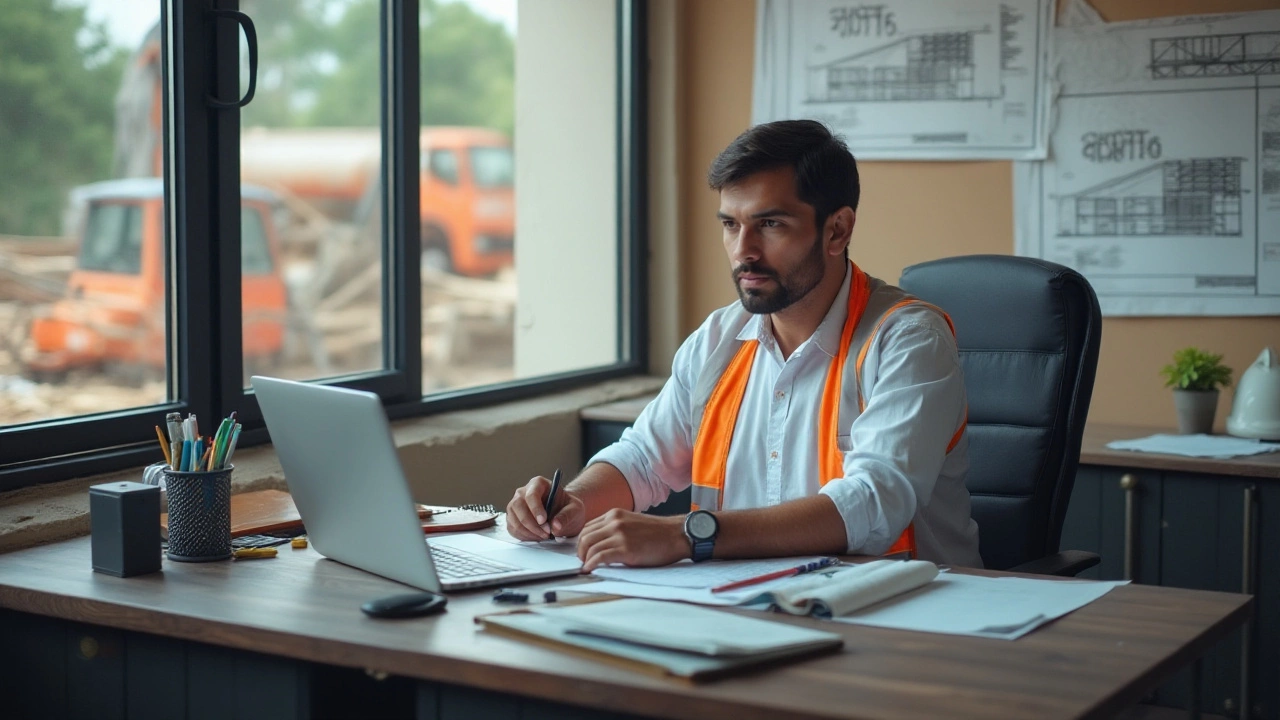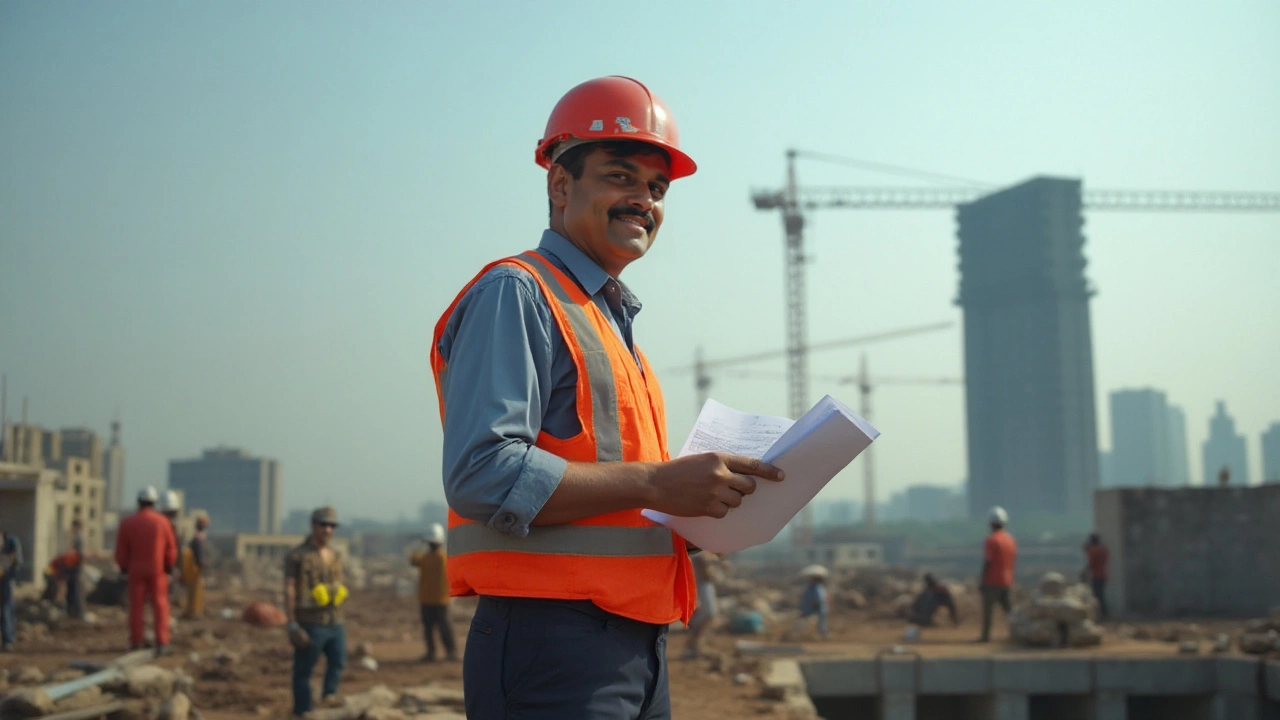In the bustling domain of construction, where dreams are crafted into tangible structures, the general contractor stands as a guiding force. Their role, though often unsung, is critical in orchestrating the myriad of elements that lead to successful project completion.
From liaising with architects and engineers to managing teams and resources, general contractors bridge the gap between a project's conception and its realization. Their expertise ensures that projects are not only completed on time but are also aligned with safety regulations and set budgets.
The article unfolds the layers of a general contractor's responsibilities, offering a window into the skills and challenges inherent to this profession, alongside tips to consider when choosing the right contractor for your needs.
- Defining the Role of a General Contractor
- Key Responsibilities in Construction
- The Importance of Project Planning and Management
- Crucial Skills for Success
- Common Challenges Faced
- Tips for Hiring the Right Contractor
Defining the Role of a General Contractor
The journey of a construction project from paper to reality involves orchestrating a symphony of tasks, and the general contractor is the maestro with the baton. Their pivotal role is to oversee and coordinate all the activities on the construction site, ensuring that the project progresses smoothly. The term 'general contractor' itself is quite telling; they are responsible for handling the entire construction process by managing various subcontractors for specialized tasks. From electricians to plumbers, each team performs a specific role, and it is up to the general contractor to ensure these roles synchronize perfectly.
The responsibilities of a general contractor in construction projects go beyond just managing people. They also handle the logistics of materials, ensuring the right supplies are delivered on time and without delay, all while keeping a keen eye on the budget. This involves negotiating terms with suppliers to prevent budget overruns and efficiently allocating resources to different facets of the project. An error in this delicate balance can lead to costly delays, impacting not only the project timeline but also its financial aspects.
A general contractor also acts as the point of communication between the client and the various sub-teams involved in the project. This requires a blend of excellent interpersonal skills and a deep understanding of construction intricacies. Often, there are instances when unforeseen changes or challenges, such as inclement weather or unexpected site issues, emerge. A competent general contractor needs to adjust plans quickly, reassigning resources or scheduling tasks differently to minimize disruptions. It’s a role that demands not only technical expertise but also a strategic mindset.
Interestingly, a study noted that effective project management by a general contractor could increase project success rates by up to 40%. This statistic underscores their critical role in the industry. Additionally, the use of modern tech tools like Building Information Modeling (BIM) and project management software has become increasingly common, aiding contractors in delivering quality results efficiently. As the technological landscape in construction evolves, general contractors who adapt see substantial gains in efficiency and client satisfaction.
“The success of a construction project is largely contingent upon the skills and management prowess of the general contractor,” echoes industry veteran John G. Williams, highlighting the nuanced and multifaceted role these professionals play in every build.
If there’s a delay, blame often falls on the contractor’s shoulders, and if a project triumphantly opens on schedule, the silent accolades for seamless execution are also theirs. This position is not only about the raw hard skills but equally about the ability to foresee potential problems and mitigate risks effectively. The general contractor’s role is, without doubt, one of the most challenging and crucial aspects of bringing a construction vision to life.
Key Responsibilities in Construction
In the vast world of construction, the role of a general contractor is multifaceted and crucial. It involves more than just putting up walls and roofs. A general contractor is the maestro of a complex orchestra, where each note must be perfectly timed and executed. One key responsibility is the coordination of all activities on the construction site. This begins with understanding the architectural plans and ensuring that all work aligns with the overall design vision. They serve as the bridge between the client, the architect, and various construction teams, ensuring that communication remains clear and effective. Without such coordination, projects can quickly lose direction, leading to costly setbacks.
Another significant duty of a general contractor is to manage the budget. This isn't just about keeping costs down, although that is certainly a part of it. It's about ensuring that funds are allocated appropriately to keep the project on track. This means the contractor must have a firm grasp on all financial aspects, from labor costs to materials, and keep a watchful eye on expenditures to avoid overruns. Moreover, sourcing materials quickly and at the right price is vital; sourcing delays can halt a project, which then impacts both timeline and budget.
The contractor is also responsible for hiring and overseeing subcontractors. Whether it's electricians, plumbers, or carpenters, these specialists rely on the contractor's leadership to know what is expected and when. It's the contractor's job to make sure that each specialist completes their part efficiently and correctly, adhering to high standards of quality and safety. This ensures that all aspects of the construction come together seamlessly.
Safety on the construction site is yet another critical responsibility. A general contractor must ensure that all workers adhere to safety protocols to mitigate the risks of accidents. This includes conducting regular inspections, making certain that equipment is up to standard, and providing necessary safety training. "Safety is something that happens between your ears, not something you hold in your hands," said a respected figure in construction, Rocky T. Anderson. This quote highlights the importance of cultivating a safety-first mindset within the workforce.
Scheduling and workflow management is another area under the purview of a general contractor. They need to create a timeline that accounts for all parts of the project, coordinating both human and material resources to ensure that each phase is completed on schedule. Inefficient scheduling can lead to idle workers and missed deadlines, which stress both the client and the contractor.
Finally, quality control is a significant aspect of a contractor's responsibilities. The contractor must ensure that each part of the construction meets the highest standards and adheres to all building codes and regulations. This involves regular inspections and quality assessments to verify that the work being done aligns with both the client's expectations and legal standards. An attention to detail in this area ensures long-term satisfaction for the client and a reputation for excellence for the contractor.

The Importance of Project Planning and Management
The role of a general contractor in construction is akin to that of a conductor in an orchestra, harmonizing every aspect of a project's symphony. At the heart of this orchestration lies meticulous project planning and management. Without it, even the most carefully laid blueprints risk falling apart amidst the chaos of unexpected challenges and shifting deadlines. Planning is not merely an administrative task; it is the strategic bedrock on which successful construction projects are built. It involves setting clear objectives, defining the scope, mapping out timelines, and allocating resources with precision. Every construction project begins with an initial plan that outlines the critical path—identifying which segments of the project need prioritized attention to keep the overall structure on track.
Effective project management goes hand-in-hand with planning, transforming theoretical timelines into real-world achievements. Considered a lifeline, it involves adhering to set budgets while ensuring high-quality delivery of the project’s requirements. A general contractor must juggle multiple vendors, subcontractors, and stakeholders, each with their own roles and interests. This requires the ability to swiftly adapt to changes, such as fluctuating material costs or labor shortages. Regular construction meetings, site inspections, and progress reports are vital tools that help maintain oversight. The general contractor's job is to foresee potential problems and proactively resolve them before they escalate. By offering clear communication channels and consistent updates, the contractor keeps everyone informed and aligned, which bolsters team morale and confidence in the project’s success.
"Good buildings come from good people, and all problems are solved by good design," said Stephen Gardiner, emphasizing the integral relationship between design and execution.
To illustrate the indispensable nature of planning and management, consider that nearly 70% of construction projects fail to meet their original schedules and budgets. Yet, those with robust planning processes are more likely to reach a successful conclusion. Leveraging technology, modern general contractors utilize project management software to streamline processes—from scheduling to resource allocation—ensuring every cog in the construction wheel turns smoothly. The software often includes features like real-time collaboration tools, which allow all parties to access and update information instantly, reducing the risk of miscommunication.
In enhancing the efficacy of a construction project as a general contractor, planning and management not only chart a course for the project's fruition but also foster innovation. By thoroughly understanding the project's demands, a general contractor can identify areas of improvement and integrate sustainable practices or innovative building techniques. This proactive approach does not only save costs but can also improve the building’s longevity and environmental footprint, aligning with modern values of sustainability. Overall, the importance of adept project planning and management in construction cannot be overstated, serving as the linchpin in bringing complex projects to life with precision and professionalism.
Crucial Skills for Success
For a general contractor to truly excel in the competitive realm of construction projects, they must possess a diverse skill set that goes beyond simply managing work sites. One of the foremost skills is leadership. A general contractor must inspire confidence and lead a team that includes architects, engineers, tradesmen, and laborers. Each of these professionals relies on the contractor to coordinate efforts efficiently and with precision, which is no small feat when dealing with complex structures and varied timelines. Effective communication is pivotal here; it's about delivering clear directives and facilitating smooth exchanges between various parties involved in the project.
Another critical skill is problem-solving. Construction sites are dynamic environments where unexpected issues can arise, such as supply chain delays or unforeseen weather conditions. A successful contractor quickly assesses these problems, devises practical solutions, and implements them swiftly to keep the project on track. An ability to remain calm under pressure is a tremendous advantage, helping them make sound decisions without succumbing to stress. As quoted by Mike Rowe, a well-known advocate for skilled trades, "Opportunity usually shows up in overalls and looking like work." This encapsulates the contractor's readiness to tackle issues head-on.
Technical know-how is indispensable. While a contractor need not be an expert craftsman, a comprehensive understanding of construction processes and materials is essential. This knowledge facilitates informed decision-making when it comes to resource allocation, cost estimation, and quality control. Contractors also benefit from a sound grasp of modern technologies and software used in construction, which can optimize project planning and execution. For example, utilizing Building Information Modeling (BIM) can immensely enhance the precision and efficiency of project designs.
Moreover, financial acumen is vital for steering the budgetary aspects of a project. Whether it's sourcing materials at reasonable rates or negotiating contracts with subcontractors, proficiency in financial management ensures that projects don't exceed budgets while maintaining quality standards. Contractors regularly engage in meticulous cost analyses to align spending with client expectations and financial constraints. A survey conducted by the National Association of Home Builders indicated that, on average, 45% of project challenges stem from budget overruns, highlighting the significance of financial competence.
Lastly, an innate understanding and commitment to safety regulations cannot be understated. The construction industry is fraught with potential hazards, and ensuring the well-being of every worker is both a legal and ethical obligation. Contractors must be vigilant in implementing safety protocols and ensuring all participants on site are trained to follow them. Regular site inspections and safety meetings are crucial to fostering a culture of safety. Hence, emphasizing strong safety practices can significantly reduce accidents and contribute to the project's success.

Common Challenges Faced
The role of a general contractor in construction projects can resemble a tightrope walker balancing various tasks and challenges. One significant challenge is managing the *unpredictable nature* of construction timelines. Weather conditions, such as sudden snowstorms or unexpected rainfall, can disrupt even the most meticulously planned schedules. What was on track to finish flawlessly in the spring might suddenly extend into late summer, inflating costs and stressing all stakeholders involved. The art of juggling these dynamic elements, while keeping morale high and the end goal in sight, is nothing short of a Herculean task.
Another notable challenge is harmonizing the plethora of personnel involved in a project. From architects and structural engineers to electricians and plumbers, each team brings a unique perspective, often accompanied by individual nuances that need mediation. Ensuring seamless communication across disciplines can prevent costly mistakes. Miscommunication might lead to an electrical system not aligning with architectural plans, necessitating revisions, which can be both time-consuming and expensive. Cultivating an environment where all parties feel heard and understood becomes imperative for any construction project aiming for success.
"The essence of successful project management lies not in eliminating risks, but in foreseeing and minimizing them," says Mark Stroll, a seasoned project manager with over two decades of industry experience.
Financial pressures pose another formidable obstacle. Budgets are often tight, and any deviation can tip the balance from profit to loss. Supplies might experience price surges, or unforeseen design alterations called for by clients can bloat expenses. It becomes the general contractor's duty to deftly manage these tides and ensure financial feasibility without compromising on quality. This requires not only a deep understanding of market dynamics but also the negotiation prowess to secure fair deals with suppliers and subcontractors.
Additionally, navigating bureaucratic landscapes to ensure compliance with building codes and regulations presents its own maze of hurdles. The construction industry is heavily regulated, with permits and inspections at every turn. Keeping abreast of ever-evolving standards and ensuring all documentation is current is essential to avoid work stoppages, fines, or even legal action. This makes the role of a general contractor not just about building but about crafting a comprehensive strategy to preempt and address these potent challenges with foresight and resilience.
Tips for Hiring the Right Contractor
Choosing the right general contractor for your construction project is akin to laying a strong foundation for a building. Your selection will significantly impact the outcome, from the quality of work to the overall project timeline. One valuable approach to kickstart your search is by scrutinizing their experience and expertise in specific types of construction projects. Ideally, you should look for contractors who have successfully completed projects similar in scale and scope to yours; their knowledge in handling potential challenges and complexities will be invaluable.
Don't underestimate the power of references and reviews. Contact previous clients to gain insights into the contractor's reliability, work ethic, and ability to meet deadlines. Many platforms provide ratings and reviews, but a personal conversation can reveal deeper insights. When contacting references, ask detailed questions about the contractor roles and how effectively they managed the workflow. A direct question like, "How did they handle unforeseen issues?" can lead to informative responses.
Licensing and insurance are two non-negotiable facets when choosing the right contractor. Ensure they have the appropriate licenses to operate in your area and that their insurance policies cover any potential damage or injuries that may occur on site. A well-insured contractor provides peace of mind, knowing that both your property and the workforce are protected against unforeseen claims and liabilities.
"Remember, trust is as important as cost. A contractor who offers the lowest price might not always deliver the best value," says industry veteran Jack Henderson.
Engage potential contractors in detailed discussions about your project. Clarify your vision and expectations, and carefully assess their responses. Do they understand the unique nuances of your project? Are they asking relevant questions that indicate a grasp of your needs? Their level of engagement and curiosity about your project is often a reliable indicator of their commitment to quality work.
Consider drafting a detailed contract that outlines all agreements, including deadlines, budgets, and scope of work. This creates accountability and provides a reference point for both parties should disputes arise. Don’t hesitate to seek legal advice to ensure your contract is comprehensive and legally binding. Attention to these contractual details might seem tedious, but they are essential guardrails that protect your interests and help shore up a smooth collaboration throughout the project.
For those keen on obtaining a more data-driven perspective, the 2023 National Association of Home Builders survey shows that 70% of satisfied customers highlight clear communication as a key determinant to a successful contractor-client relationship. Always prioritize contractors who are transparent and communicative, as these qualities often lead to fruitful projects and satisfied partnerships.
Take your time to research and vet potential candidates. Rushing into a decision without adequately investigating options could lead to undesirable outcomes. By methodically addressing the factors of experience, references, licensing, and communication, you'll place yourself in an optimal position to select a contractor who will execute your project with precision and professionalism.

Written by Fletcher Abernathy
View all posts by: Fletcher Abernathy